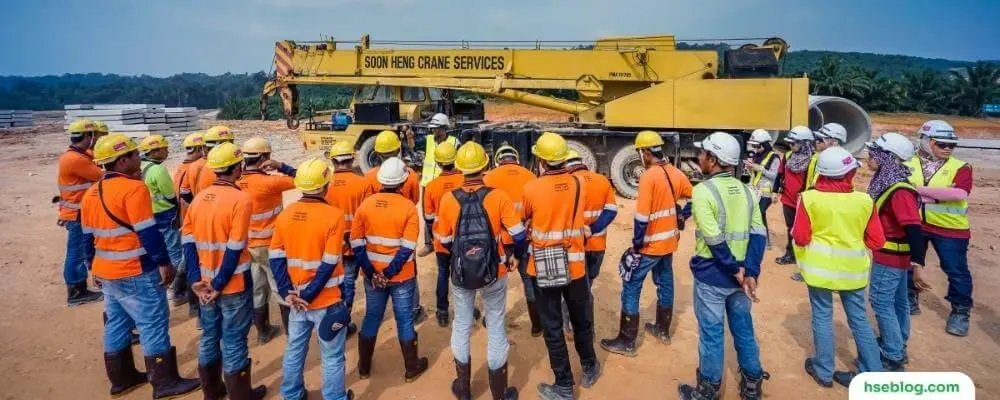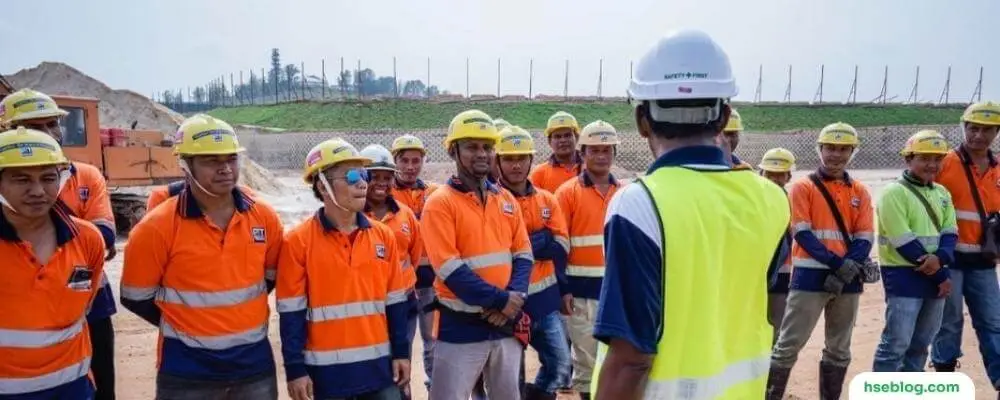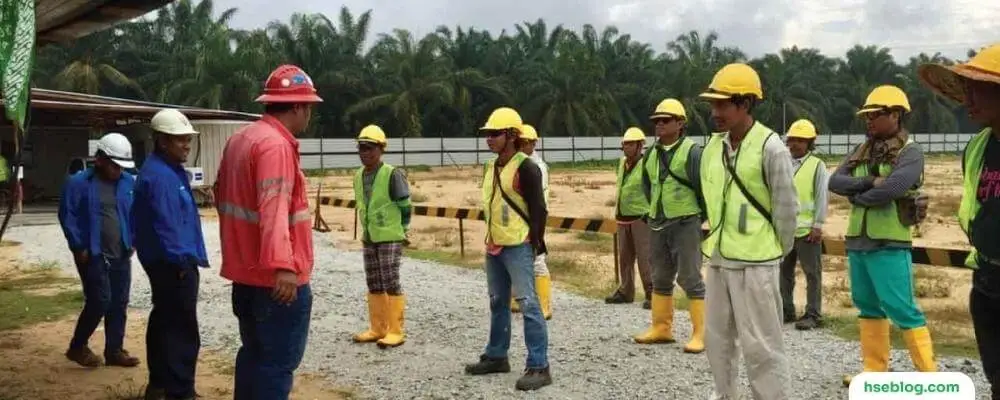Creating a safe and healthy work environment is a top priority for businesses of all sizes. Health and safety hazards can cause accidents and injuries, resulting in lost productivity, increased costs, and potential legal liabilities. To minimize these risks, businesses must prioritize health and safety and make it a part of their daily routine.
One effective way to do this is through daily toolbox talks. Toolbox talks are short safety meetings held regularly to discuss health and safety issues and reinforce best practices. In this blog post, we will discuss 12 reasons why daily toolbox talks are so important and how they can help promote a strong health and safety culture in the workplace.
From encouraging continuous improvement to promoting teamwork and regulatory compliance, daily toolbox talks can be a powerful tool for businesses to promote safety and reduce the risk of accidents and injuries. So, let’s dive in and explore the benefits of daily toolbox talks in more detail.
Reasons To Have Daily Toolbox Talks
Daily toolbox talks are short safety meetings held at the beginning of a work shift or during breaks to discuss relevant safety topics and hazards on the job site. Here are some reasons why daily toolbox talks are important:
1. To Begin Each Day With The Right Attitude
A daily toolbox talk aims to remind workers of the importance of health and safety at work. By starting each day with a toolbox talk, workers are reminded of the potential hazards and risks they may face during the day and how to prevent them.
Sometimes workers can become complacent or forgetful about health and safety practices, especially if they have been doing the same job for a long time. However, accidents can happen anytime, and the consequences can be severe. A daily toolbox talk serves as a refresher course, ensuring workers know the hazards and risks and how to prevent them.
The toolbox talk also sets the tone for the day, emphasizing the importance of safety and the company’s commitment to ensuring a safe working environment. By emphasizing the importance of safety, workers are more likely to be vigilant and focused on maintaining a safe work environment throughout the day.
Furthermore, starting the day with a positive health and safety attitude can ripple effect on the rest of the day’s work. Workers who focus on safety are less likely to make mistakes or become distracted. This focus on safety can improve productivity, reduce the risk of accidents, and create a positive work environment.

2. To Keep Health And Safety Knowledge Fresh In Mind
Toolbox talks are an effective way to keep health and safety knowledge refreshed. While employees may receive formal training on health and safety when they first join a company, it can be challenging to remember all the training details over time. A toolbox talk can reinforce key safety messages, remind workers of best practices, and reinforce the importance of safety on the job.
These talks can also address specific safety concerns or hazards identified on the job. By focusing on specific issues, workers are more likely to remember the information discussed in the toolbox talk and be able to apply it to their work.
Refreshed safety knowledge is crucial to maintaining a safe work environment. Workers with up-to-date information on safety procedures are more likely to avoid accidents and injuries and will be better equipped to respond to emergencies when they arise. A toolbox talk can be a valuable tool in keeping safety knowledge fresh in workers’ minds, and it can help ensure that the workplace remains a safe and healthy environment for everyone.
3. To Build Teamwork
Daily toolbox talks can be used to promote teamwork and collaboration among workers. By discussing health and safety issues and sharing ideas for how to address them, workers can build trust and respect among each other, creating a stronger and more cohesive team.
Health and safety are everyone’s responsibility in the workplace. By encouraging workers to participate in toolbox talks, businesses can create a culture where everyone is invested in maintaining a safe and healthy work environment. By promoting teamwork, businesses can foster a sense of ownership and responsibility among workers for health and safety.
Moreover, toolbox talks can encourage workers to share their ideas and experiences related to health and safety issues. By sharing best practices and lessons learned, workers can learn from each other and improve their health and safety practices.
Teamwork can also be promoted by encouraging workers to participate in workplace inspections and audits. By working together to identify hazards and risks, workers can learn from each other and create a stronger culture of safety in the workplace.
Finally, toolbox talks can be used to recognize and reward positive health and safety behaviors. By acknowledging workers who have demonstrated a strong commitment to health and safety, businesses can create a culture where workers feel valued and motivated to maintain safe work practices.

4. To Stay Up To Date
Staying up-to-date is another essential reason to have daily toolbox talks. Changes in regulations, tools, or substances can significantly impact workplace safety. Regularly communicating these changes to workers is crucial in ensuring they know the new risks and how to manage them.
A quick toolbox talk can update workers on new procedures, protocols, or regulations. It is an effective way to communicate any changes that may impact their work and to provide them with the necessary information to stay safe.
Toolbox talks can also be used to discuss any new equipment or tools being introduced into the workplace. Workers need to be aware of how to use these tools safely and understand their potential hazards.
Similarly, if a new substance is being used in the workplace, a toolbox talk can be used to discuss the necessary precautions and PPE required when handling it. Workers need to be aware of the risks associated with the substance and how to handle it safely.
By staying up-to-date and communicating changes regularly through toolbox talks, workers can stay informed and adapt their work practices accordingly, ensuring a safe and healthy workplace.
5. To Get In The Habit
Daily toolbox talks can help establish regular communication habits and reinforce the importance of health and safety in the workplace. By making the toolbox talk a part of the daily routine, workers are more likely to remember the key safety messages and make them a part of their daily work practices.
Incorporating daily toolbox talks into the workday can help to create a culture of safety in the workplace. By making health and safety a part of the daily routine, workers are more likely to prioritize safety and develop good habits that will help them avoid accidents and injuries.
Furthermore, by establishing a habit of regular communication around health and safety, workers are more likely to speak up if they identify any hazards or risks in the workplace. They will feel comfortable bringing up concerns with their colleagues or supervisors, which can help prevent accidents before they occur.
Overall, daily toolbox talks can help to create a positive health and safety culture in the workplace and establish good habits that will benefit everyone.

6. To Stay Alert
A daily toolbox talk can help to keep workers alert and focused on safety. Arriving at work feeling rushed or distracted can make it challenging to stay alert and focused on safety. However, by starting the day with a toolbox talk, workers are reminded of the importance of being alert and aware of their surroundings.
The toolbox talk can be used to discuss any specific hazards or risks that may be present on that particular day or job site. This can help workers to be more attentive to these risks and take the necessary precautions to avoid accidents or injuries.
Furthermore, a daily toolbox talk can help to reinforce the idea that safety is everyone’s responsibility. Workers are reminded that they have a role in keeping themselves and their colleagues safe. By emphasizing this message, workers are more likely to be vigilant and alert throughout the day, reducing the risk of accidents and injuries.
In summary, a daily toolbox talk can be an effective way to keep workers alert and focused on safety. By starting the day with a reminder of the importance of safety, workers are more likely to be alert and aware of the potential hazards and risks around them, creating a safer work environment for everyone.
7. To Encourage Continuous Improvement
Toolbox talks can encourage workers to identify and report hazards or near-miss incidents. By discussing these incidents and finding ways to prevent them from happening again, workers can learn from mistakes and continuously improve health and safety practices in the workplace. In some cases, conducting a formal safety stand down can be an effective way to reinforce these lessons and address safety gaps more comprehensively.
Near-miss incidents could have resulted in an injury or accident but did not. They are often a sign that something is not quite right with the health and safety practices in the workplace. By discussing these incidents during a toolbox talk, workers can learn from the mistakes made and find ways to prevent similar incidents from happening in the future.
In addition, toolbox talks can encourage workers to report hazards or potential risks in the workplace. By identifying these hazards and discussing ways to address them, workers can take proactive steps to prevent accidents and injuries from occurring.
Moreover, toolbox talks can be used to review and improve existing health and safety procedures. Workers can provide feedback on what works well and what could be improved. By taking this feedback into account, businesses can make necessary changes to improve health and safety practices in the workplace.

8. To Get Health And Safety In The Conversation
Toolbox talks can be an effective way to get health and safety into the conversation and keep it on the mind of workers. Health and safety may not always be the most engaging topic, but by making the toolbox talk short, to the point, and interesting, workers are more likely to remember the key messages.
Toolbox talks can also spark discussions among team members, encouraging them to help each other stay safe. When workers are clued up on health and safety measures, they are more likely to notice something wrong and speak up to prevent accidents or injuries.
Additionally, the toolbox talk can create a dialogue between management and workers about an issue that may have otherwise gone unreported. Workers may be more likely to speak up about potential hazards or risks they have identified, and this feedback can be used to improve health and safety measures in the workplace.
In summary, toolbox talks can effectively get health and safety into the conversation and keep it on workers’ minds. By encouraging discussion and feedback, toolbox talks can help to improve health and safety practices in the workplace and create a safer work environment for everyone.
9. To Raise Awareness
Daily toolbox talks can effectively raise awareness about a range of health and safety topics, including those not typically covered in formal training courses.
By focusing on one specific topic during each toolbox talk, workers can better understand the risks and hazards associated with that topic. Over time, as more and more topics are covered, workers’ overall awareness of health and safety issues will increase.
Furthermore, toolbox talks can be tailored to your workplace’s specific needs, addressing topics specific to your industry or workplace. This can help workers understand the risks and hazards they may face on a day-to-day basis and how to manage them effectively.
Raising awareness about health and safety is crucial in preventing accidents and injuries in the workplace. By increasing workers’ knowledge and perception of the risks and hazards around them, they are better equipped to identify potential hazards and take the necessary precautions to avoid accidents.
In summary, daily toolbox talks can effectively raise awareness about a range of health and safety topics tailored to the specific needs of your workplace. By increasing overall health and safety awareness, workers can work more safely and reduce the risk of accidents and injuries.

10. To Show Management Commitment
Showing management commitment to health and safety is crucial in creating a strong safety culture in the workplace. When workers see that management takes health and safety seriously, they are likelier to take them seriously.
Management can demonstrate their commitment to safe working practices by having a daily toolbox talk. These talks can emphasize the importance of health and safety in the workplace and remind workers that it is a top priority.
Furthermore, by making health and safety a part of the daily routine, workers are more likely to see that management is committed to maintaining a safe working environment. This commitment can extend to providing necessary resources, such as training, equipment, and PPE, to ensure workers can perform their jobs safely.
Overall, a daily toolbox talk is an effective way for management to demonstrate their commitment to health and safety in the workplace. By emphasizing the importance of safety and making it a part of the daily routine, workers are more likely to prioritize safety and work towards creating a safer and healthier work environment for everyone.
11. To Grow A Positive Health And Safety Culture
Growing a positive health and safety culture is essential in ensuring the safety and well-being of workers and creating a successful and sustainable business.
A positive health and safety culture is built on shared values, attitudes, competencies, and behaviors prioritizing safety and ensuring everyone is committed to creating a safe and healthy work environment. Regular toolbox talks can be an effective way to promote and reinforce these values and attitudes.
By making health and safety a regular part of the daily routine, workers are more likely to see that safety is a top priority for the business. This can help to create a culture where everyone is aware of the potential risks and hazards in the workplace and is committed to taking the necessary precautions to avoid accidents and injuries.
Furthermore, toolbox talks can be used to encourage worker participation in the development of health and safety policies and procedures. This participation can help to create a sense of ownership among workers, fostering a culture of responsibility and accountability for health and safety in the workplace.

12. To Comply With Regulations
Toolbox talks can be used to ensure compliance with health and safety regulations and standards. By discussing regulatory requirements and best practices for compliance, workers can be better prepared to meet regulatory requirements and avoid costly fines and penalties.
Health and safety regulations and standards are put in place to ensure that workers are protected from hazards and risks in the workplace. By conducting regular toolbox talks focusing on regulatory compliance, businesses can ensure that workers know the regulatory requirements and the importance of compliance.
In addition, toolbox talks can be used to review and reinforce best practices for compliance. This can include discussing topics such as using personal protective equipment (PPE), safe work practices, and hazard identification and reporting.
Moreover, toolbox talks can address any gaps or deficiencies in compliance that may be identified during workplace inspections or audits. By discussing these issues during toolbox talks, workers can be made aware of the issues and work together to find solutions.
Finally, toolbox talks can promote a culture of compliance in the workplace. By emphasizing the importance of regulatory compliance and recognizing workers who demonstrate a strong commitment to compliance, businesses can create a culture where everyone is invested in maintaining a safe and healthy work environment.
Conclusion
Daily toolbox talks can be a powerful tool in promoting a strong health and safety culture in the workplace. By addressing health and safety issues daily, workers can stay informed and engaged in maintaining a safe and healthy work environment.
We have discussed 12 reasons why having daily toolbox talks can be beneficial. These reasons include starting each day with the right attitude, keeping health and safety knowledge refreshed, staying up to date with changes in regulations, developing good health and safety habits, staying alert to potential hazards, encouraging conversation about health and safety issues, raising awareness about health and safety topics, demonstrating management commitment to safety, promoting continuous improvement, building teamwork, ensuring compliance with regulations, and reinforcing best practices.
By implementing daily toolbox talks, businesses can help create a culture where safety is a top priority, and everyone is invested in maintaining a safe and healthy work environment. Through teamwork, continuous improvement, and regulatory compliance, workers can work more safely and reduce the risk of accidents and injuries.
In short, daily toolbox talks are a simple but powerful way to promote health and safety in the workplace and can help businesses to achieve their goals of creating a safer, healthier, and more productive work environment.

